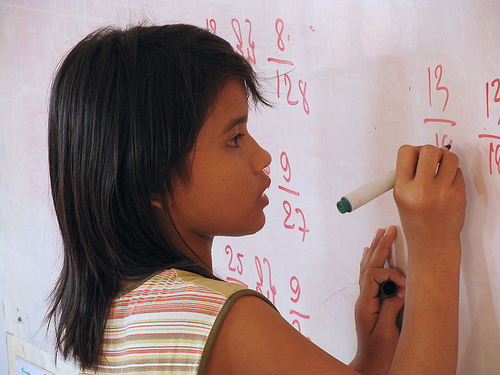By Marnell A. Cooper

Marnell A. Cooper
On a Wednesday in May my 8-year-old daughter revolted against remote learning. During the second month of taking five classes a day she declared “I’m done with taking classes on Zoom.”
Usually, she is organized and loves to complete her assignments early. In this case, she exercised her voice against COVID-19 and remote learning.
I empathized with her and was at a loss as to how to provide support.
For adults, there are challenges in producing robust discussions on video conferences. Video fails to reveal the essential physical and emotional cues and connections that we all receive and deliver to make meaning. If video conferencing is exasperating for adults imagine how children feel.
Lack of creativity
In reviewing Return-to-School plans throughout Maryland — with a specific eye to school districts with significant Black and Brown populations — there appears to be a lack of creativity — especially creative thought around how to support parents in managing the academic success of their children during the pressures and the challenges caused by remote learning during this global pandemic.
I offer the following as both a call to action for urban education and a voice for parents during this crisis. My remarks are informed by my perspectives as a Black man, a father, and a former chair of the Baltimore City Board of School Commissioners.
Schools and school systems have readily acknowledged barriers to success in schools such as kindergarten readiness and summer learning, while also providing various interventions to assist students. In the time of COVID-19, this conversation has expanded to include what is colloquially known as the ‘COVID Slump.’ To date, the burden of responsibility for preventing learning loss is unquestionably placed upon schools and nonprofit educational support agencies.
Role of families missing
The missing piece in this narrative is the role of families and community members in supporting continuous, high-quality learning experiences. Therefore, an essential issue facing all communities—with increased urgency for chronically disadvantaged communities—is how are parents and trusted adults being educated to enable young people to be academically successful in ongoing remote learning. In the Spring, schools responded to the transition to remote education with attention focused on hardware acquisition/distribution, internet access, and food distribution for low-income families.
While these issues continue to be obstacles, additional concerns emerge. Primary among those concerns is an issue that transcends socio-economic status and disproportionately impacts low-income families. That issue is the ability of parents to support the academic success of their children.
What can school systems do to provide support to parents facing their own “work at home” demands to, at a minimum, slow down the COVID Slump? How do parents determine when to let their children work independently and when to step in and offer support? What are some potential solutions that can be implemented in an urban school environment to assist parents, regardless of means and access to assistance? I offer four straightforward, cost minimal solutions here.
Four solutions
Solution one is to centralize the school week for all schools. In this time of crisis, it is helpful for all classes to have the assignments due on the same day of the week, such as Friday. Synching expectations for tasks allows parents to assist their children in planning out the week and children in completing assignments.
Second, reduce the school week to four days. Parents will be addressing significant burnout with their children, specifically the younger ones, with five days of their children being online for five to six hours per day.
Third, provide opportunities for inquiry and play through physical education, arts and science throughout each school day for every student.
Fourth, create a real-time helpline. School systems should provide a helpline from 8am-8pm staffed by educators from multiple content areas, as well as social and emotional support personnel.
Challenges will arise for parents during remote learning that will need to be addressed immediately to provide support for their children. While these solutions may seem arduous to implement, they are a must to ensure that an 8-year-old who loves school does not become disenchanted, causing her parents to revolt.
Marnell A. Cooper is a Baltimore attorney [email protected]




Recent Comments